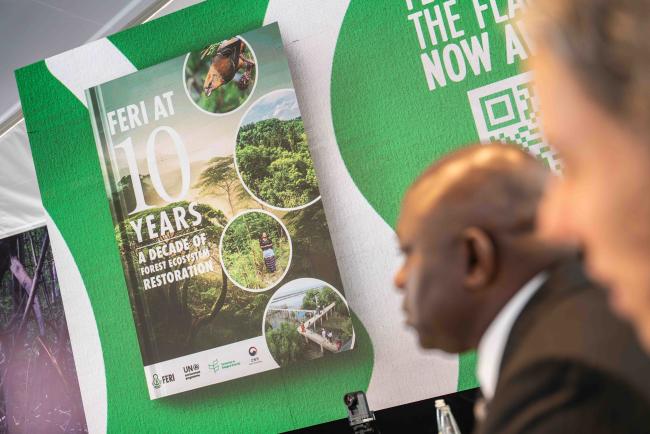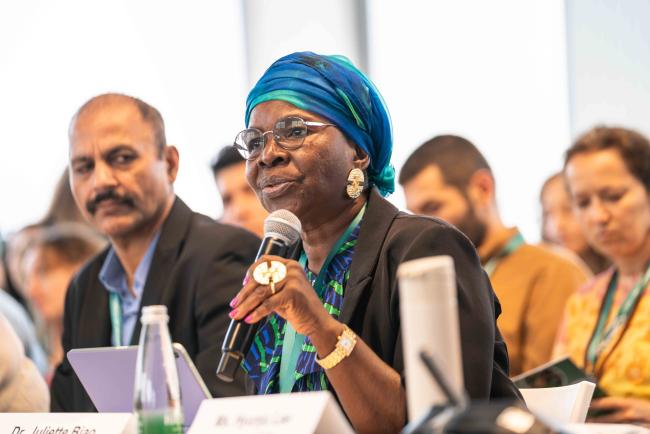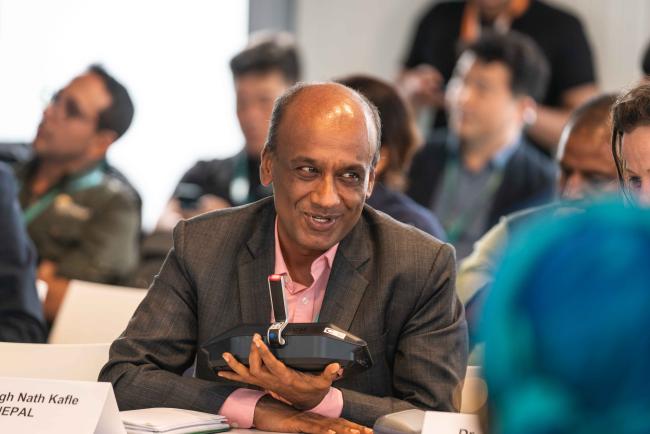About
Forests provide 80% of the world’s terrestrial biodiversity; yet each year over 10 million hectares of forests are lost to deforestation. The Forest Ecosystem Restoration Initiative (FERI), a collaborative project supported by the Korea Forest Service and the Secretariat of the Convention on Biological Diversity (CBD), is working to help countries achieve key biodiversity targets related to ecosystem restoration, habitat conservation, and forest rehabilitation through technical support, capacity building, and funding. This event featured successes and challenges associated with forest restoration, including current and future collaborative initiatives.
Moderator Jamal Annagylyjova, CBD Secretariat, introduced the panel, calling the Republic of Korea a model for forest restoration, and announced the publication of the report, FERI at 10 Years: A Decade of Forest Ecosystem Restoration. A short video focused on FERI was then presented.
Hyunju Lee, Korea Forest Service, outlined successful forest rehabilitation projects in the Republic of Korea, noting that her country’s forests were degraded after the Korean War. She said active civic engagement was a key factor in successful efforts in her country, including the planting of 10 million trees since 1973. She highlighted the importance of support for countries in establishing biodiversity plans and the role of forest restoration in addressing climate change and biodiversity loss.
Juliette Biao, Director, UN Forum on Forests (UNFF) Secretariat, noted complementarities between the UNFF and CBD, and emphasized the need to leverage the synergies of shared goals and targets of international frameworks. She said effective implementation of the Kunming-Montreal Global Biodiversity Framework (GBF) “is not possible without great action to conserve, restore, and sustainably manage our forests.” She called attention to the Joint Initiative between the UNFF and CBD on harnessing synergies between the global forest and biodiversity agendas, and to a High-Level event at the upcoming COP to the UN Framework Convention on Climate Change (UNFCCC) that will focus on initiatives related to forest conservation. She also called attention to the UN Forest Pavilion, a collaborative platform during international conferences to highlight the role of forests in addressing climate change, biodiversity loss, and sustainable development.
Gisele Didier, Humboldt Institute, Colombia, shared her country’s experience with the WePlan Forests tool, which supports planning and evaluating forest restoration options. She described a project focused on degraded forest landscapes designed to evaluate priorities for forest restoration by looking at opportunity costs associated with different trade-offs. She noted challenges associated with forest restoration decision making, including timing considerations, scale, and the importance of monitoring and reporting, including through citizen science.
Fabiola Zerbini, Ministry of Environment and Climate Change, Brazil, noted her country’s recent progress on reducing deforestation, including a 48% decrease in deforestation rates, and the creation of 400,000 hectares of conservation units. She said this is part of Brazil’s new approach to put conservation at the center, and noted efforts to address degraded lands that also consider social and economic issues. She outlined various challenges, including protecting secondary forests, recovering degraded lands within conservation units, and reinforcing the Brazilian Forest Code, related to the use and preservation of forests.
Megh Nath Kafle, Ministry of Forests and Environment, Nepal, said forests are at the heart of his country’s National Biodiversity Strategy and Action Plan (NBSAP). He shared the use of indicators to measure progress in forest restoration, highlighting an increase in forest cover from 21% to 44%. He outlined some of the challenges associated with biodiversity conservation, including the need for appropriate technology, and emphasized linking policy with management practices and incorporating human rights in NBSAPs.
Chouaibou Nchoutpouen, Central African Forests Commission, spoke on regional cooperation priorities. He emphasized strengthening relations, including with national operational offices, and providing technical assistance to countries in the region, noting that countries identified training as key priority.
During a question and answer period at the close of the session, Hyunju Lee was asked to share insights about the Republic of Korea’s successful forest restoration history. She described the establishment of the Korea Forest Service in 1967, followed by development of a 10-year forest restoration plan in 1973 and collaboration with local communities. She also noted the creation of jobs through forest restoration projects, and a shift away from using trees for cooking. She said her country is eager to share its forest restoration experience with the global community through various international programmes.
Organizers: FERI, Korea Forest Service
Contact: matheus.couto@un.org
For more information: https://www.cbd-feri.org
To receive free coverage of global environmental events delivered to your inbox, subscribe to the ENB Update newsletter.
All ENB photos are free to use with attribution. For the 2024 UN Biodiversity Conference, please use: Photo by IISD/ENB | Mika Schroder



















